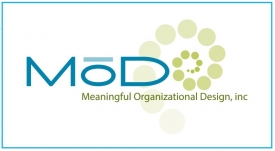

Meaningful Organizational Design, Inc.

California, United States
January 2010
Management consultant - for-profits
Service with Minor Environmental Footprint
United States
MOD is a management consulting and coaching company specializing in Meaningful Organizational Design, supporting organizations with Strategic Envisioning and Planning services using the latest innovation ideas from social enterprise and Conscious Capitalism principles. A unique management consulting methodology for enhancing an organization’s health and business performance. MOD helps organizations design their future using a meaningful innovation and strategy framework. This framework is used as a knowledge management capture tool, to troubleshoot systemic organizational problems within organizations or teams, to analyze and support a positive organizational culture, and for team building and team alignment. MOD services are ideal for Strategic Planning and Leadership Development retreats. MOD’s cofounders also specialize in Mindfulness-Based Leadership Coaching and Library & Information Management Services. As a California Benefit Corporation and a certified B Corp since 2010, MOD helps businesses and individuals become positive forces for good on the planet by increasing shared value for stakeholders. MOD has helped many clients become certified B Corps, supporting them to develop affordable and sustainable organizational, social and environmental innovations
Overall B Impact Score
Governance 17.2
Governance evaluates a company's overall mission, engagement around its social/environmental impact, ethics, and transparency. This section also evaluates the ability of a company to protect their mission and formally consider stakeholders in decision making through their corporate structure (e.g. benefit corporation) or corporate governing documents.
What is this? A company with an Impact Business Model is intentionally designed to create a specific positive outcome for one of its stakeholders - such as workers, community, environment, or customers.
Community 86.4
Community evaluates a company’s engagement with and impact on the communities in which it operates, hires from, and sources from. Topics include diversity, equity & inclusion, economic impact, civic engagement, charitable giving, and supply chain management. In addition, this section recognizes business models that are designed to address specific community-oriented problems, such as poverty alleviation through fair trade sourcing or distribution via microenterprises, producer cooperative models, locally focused economic development, and formal charitable giving commitments.
What is this? A company with an Impact Business Model is intentionally designed to create a specific positive outcome for one of its stakeholders - such as workers, community, environment, or customers.
Environment 16.4
Environment evaluates a company’s overall environmental management practices as well as its impact on the air, climate, water, land, and biodiversity. This includes the direct impact of a company’s operations and, when applicable its supply chain and distribution channels. This section also recognizes companies with environmentally innovative production processes and those that sell products or services that have a positive environmental impact. Some examples might include products and services that create renewable energy, reduce consumption or waste, conserve land or wildlife, provide less toxic alternatives to the market, or educate people about environmental problems.
Customers 31.1
Customers evaluates a company’s stewardship of its customers through the quality of its products and services, ethical marketing, data privacy and security, and feedback channels. In addition, this section recognizes products or services that are designed to address a particular social problem for or through its customers, such as health or educational products, arts & media products, serving underserved customers/clients, and services that improve the social impact of other businesses or organizations.
What is this? A company with an Impact Business Model is intentionally designed to create a specific positive outcome for one of its stakeholders - such as workers, community, environment, or customers.